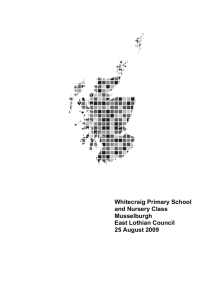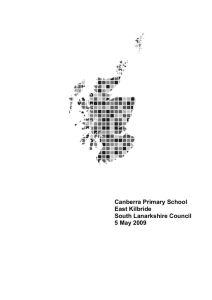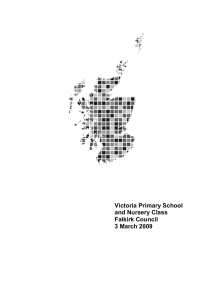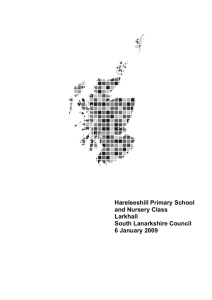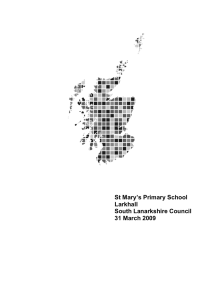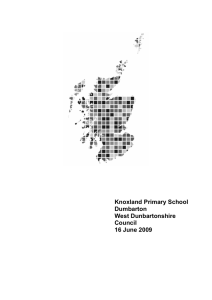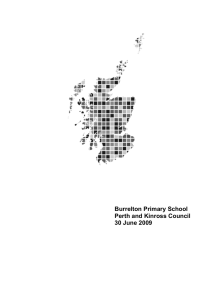Quarryhill School and Nursery Class Aberdeen City Council
advertisement
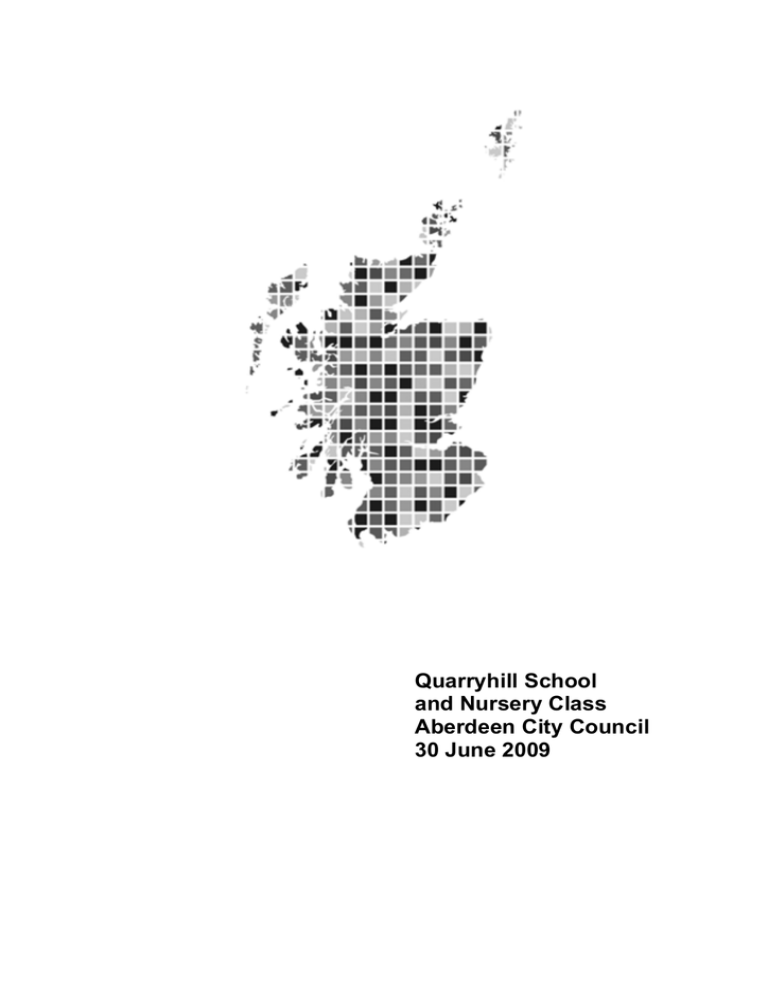
Quarryhill School and Nursery Class Aberdeen City Council 30 June 2009 This report tells you about the quality of education at the school1. We describe how children benefit from learning there. We explain how well they are doing and how good the school is at helping them to learn. Then we look at the ways in which the school does this. We describe how well the school works with other groups in the community, including parents2 and services which support children. We also comment on how well staff and children work together and how they go about improving the school. Our report describes the ‘ethos’ of the school. By ‘ethos’ we mean the relationships in the school, how well children are cared for and treated and how much is expected of them in all aspects of school life. Finally, we comment on the school’s aims. In particular, we focus on how well the aims help staff to deliver high quality learning, and the impact of leadership on the school’s success in achieving these aims. If you would like to learn more about our inspection of the school, please visit www.hmie.gov.uk. Here you can find analyses of questionnaire returns. Where applicable, you will also be able to find descriptions of good practice in the school. 1 2 The term ‘school’ is used to include the work of the nursery class, where relevant. Throughout this report, the term ‘parents’ should be taken to include foster carers, residential care staff and carers who are relatives or friends. Contents 1. The school 2. Particular strengths of the school 3. How well do children learn and achieve? 4. How well do staff work with others to support children’s learning? 5. Are staff and children actively involved in improving their school community? 6. Does the school have high expectations of all children? 7. Does the school have a clear sense of direction? 8. What happens next? 1. The school Quarryhill School is a non-denominational school with a nursery class. It serves an area in the north of Aberdeen. The roll was 325, including 40 in the nursery and 14 in the base for children with additional support needs when the inspection was carried out in May 2009. Children’s attendance was below the national average in 2007/2008. 1 2. Particular strengths of the school • The interaction between children and staff in the nursery class. • The supportive learning environment in the base for children with additional support needs. • Children’s achievements in aspects of health and wellbeing. 3. How well do children learn and achieve? Learning and achievement In the nursery class, children are making good progress in their learning. Almost all children talk to others confidently. They are keen to discuss specific interests. They enjoy listening to stories and retelling them. Children are developing early writing skills well during play activities. They make good use of early counting skills when preparing snack and during role-play. Children are enthusiastic when taking part in activities such as planting, which encourages their interest in the natural world. In the primary classes and the additional support needs base, most children are motivated and keen to learn. However, they need more opportunities to undertake independent research, to work in groups and to be involved in decisions about how to improve their learning. In the best lessons, children respond well to the increasing opportunities to be actively involved in their learning. At the early stages, children are motivated in their learning through the effective use of games and group work. In drama, children work well in pairs to develop and perform role-play scenarios related to class topics. In health education lessons, they cooperate effectively when working in groups. Most children have a very good understanding of how to keep safe and healthy. They are developing good coordination and improving their 2 levels of fitness during high quality physical education lessons. Recently, children broadened their learning by taking part in a week of practical activities and visits to local places of interest. Some children take on additional responsibilities as members of the eco group and pupil council. The eco group is successful at raising awareness of environmental issues. The school’s national levels of attainment in English language and mathematics have been below that of similar schools for several years. By P7, the majority of children achieve appropriate national levels in reading and less than half achieve these levels in writing and mathematics. In English language, from P1 onwards, most children listen well and can follow instructions and directions. At the upper stages, children’s skills in group discussion are not well developed. Across the school, children read prepared text from the reading scheme well. They are less confident in reading popular fiction and using non-fiction books. Children do not write at length often enough. In mathematics, children in P1 and P2 are making good progress. In the middle and upper stages, children are not confident when undertaking mental calculations. They need more practice in solving problems using everyday situations. Curriculum and meeting learning needs Overall, the curriculum is satisfactory. In the nursery class, children enjoy a good range of experiences which are firmly based on learning through play. Early literacy and numeracy skills are developed well. The outdoor area should be further developed to increase opportunities for investigative activities. Across the primary classes, staff provide a broad range of experiences for children. They have recently taken helpful steps to encourage children to read for enjoyment. Staff plan the curriculum to ensure that children develop effective skills in information and communications technology (ICT). They now need to develop their planning further so that children have more opportunities to use their writing and ICT skills in different areas of the curriculum. The current arrangements for teaching mathematics reduces opportunities for teachers to make links with other curricular areas. Effective programmes are in place to support health and physical education. The school has yet to ensure that all children 3 receive two hours of high quality physical education each week. Senior staff need to provide teachers with clearer guidance on the national initiative, Curriculum for Excellence. In the nursery classes, staff interact very well with children. They set activities at an appropriate level for most children. Staff use children’s interests to plan what they will learn next. In the primary classes, some lessons enable children to work together and learn from others. However, the quality of lessons varies too much. In some lessons, teachers are over-reliant on worksheets and textbook exercises which are not interesting enough for children. Teachers’ instructions and explanations are clear. Within English language, they provide children with feedback on how to improve writing, but this is less frequent in other curricular areas. Arrangements for homework are inconsistent across the school. Staff take appropriate steps to identify and support children who may need additional help with their learning. Support for learning staff provide well structured support for individuals and small groups of children. Steps should be taken to make better use of their skills. Staff in the additional support needs base have a good understanding of the needs of individual children. They adapt learning materials and activities effectively. Individualised educational programmes for children who attend the support base are detailed. These are reviewed regularly in partnership with children, parents and teachers. Children are becoming increasingly confident at identifying personal learning targets. Those who attend the support base make good progress. 4. How well do staff work with others to support children’s learning? The Friends of Quarryhill support the school by organising well-attended social events. The Parent Council has responded to a number of local authority consultations but parents have not been involved enough in identifying steps to improve the school. Nursery staff have a very good partnership with parents. Parent and child cooking sessions are very popular. Across the school, staff keep 4 parents informed of children’s progress through helpful reports and parents’ evenings. Parents do not receive enough information on how to help with their children’s learning. Senior staff work closely with a wide range of professionals to support individual children. The school has appropriate arrangements for investigating complaints. Senior staff now need to ensure that parents are clear about the outcome of any complaints. Effective arrangements are in place to support the welfare of children transferring from nursery to P1 and from P7 to secondary school. Further steps should be taken to strengthen curricular links between staff at these stages. 5. Are staff and children actively involved in improving their school community? Children contribute to improvement through their participation in the eco group, the pupil council and as buddies for younger children. They have helped the school achieve a commended award for health promotion activities. The eco group involve children in a range of recycling issues. Overall, however, children do not have enough involvement in decision making or discussing how their learning could be improved. Teachers contribute to working groups. Some lead additional activities, such as book clubs and cross-country running. Teachers reflect on their work and this influences future planning. Senior staff observe lessons and discuss teachers’ plans. They do not make enough use of information about children’s attainment to ensure that all children progress at an appropriate pace. Arrangements are not in place to enable support assistants to contribute their ideas for improvement. Self-evaluation activities have not led to action on key areas where there is a need for improvement. 6. Does the school have high expectations of all children? Overall, staff have positive relationships with children. However, the behaviour of a few children can interrupt the learning of others and has a negative impact on staff morale. A number of children have been 5 excluded on more than one occasion. Staff do not feel well supported when these children return to class. Children’s achievements are celebrated in assemblies but more use should be made of displays of children’s work to create a vibrant environment. Expectations of what children can achieve should be raised. Staff are committed to the care of all children. They provide children with very good support if they are upset about something. Most children feel that there is an adult they can speak to if they have a concern. Staff are clear about the school’s child protection procedures. 7. Does the school have a clear sense of direction? All staff are hardworking and committed to doing their best for the children in their care. The headteacher and other senior staff are supportive of children and families. When working with children the depute headteachers demonstrate good practice. However, planned improvements have not been implemented fully and have not made sufficient difference to children’s learning experiences. Too many children leave Quarryhill School without achieving high enough standards in literacy and numeracy. The senior team now need to create a shared vision with staff, children and parents in order to move the school forward. Teachers and support staff welcome this challenge. They will need regular support from the education authority to make the necessary improvements. 6 8. What happens next? We will carry out a follow-through inspection visit within one year of publication of this report and will report to parents on the extent to which the school has improved. Following that visit, we may continue to check the improvements the school has made. We may also carry out a second follow-through inspection within two years of the original inspection report. If a second follow-through inspection visit is necessary then it will result in another report to parents on the extent of improvement that the school has made. We have agreed the following areas for improvement with the school and education authority. • Take action to raise attainment in English language and mathematics. • Improve the deployment of support teachers and assistants to better meet the needs of all children. • Involve all staff in reviewing approaches to self-evaluation to ensure consistently high quality learning experiences for children. • Improve leadership across the school in order to take forward a Curriculum for Excellence. At the last Care Commission inspection of the nursery class there were two requirements which had been addressed. In addition, three recommendations were made. These had also been addressed. 7 Quality indicators help schools and nursery classes, education authorities and inspectors to judge what is good and what needs to be improved in the work of a school and a nursery class. You can find these quality indicators in the HMIE publications How good is our school? and The Child at the Centre. Following the inspection of each school, the Scottish Government gathers evaluations of three important quality indicators to keep track of how well all Scottish schools and nursery classes are doing. Here are the evaluations for Quarryhill School and Nursery Class. Primary school Improvements in performance Learners’ experiences Meeting learning needs weak satisfactory satisfactory Nursery class Improvements in performance Children’s experiences Meeting learning needs satisfactory good good We also evaluated the following aspects of the work of the school and nursery class. The curriculum Improvement through self-evaluation HM Inspector: Anne Park 30 June 2009 8 satisfactory weak To find out more about inspections or get an electronic copy of this report go to www.hmie.gov.uk. Please contact the Business Management and Communications Team (BMCT) if you wish to enquire about our arrangements for translated or other appropriate versions. If you wish to comment about any of our inspections, contact us at HMIEenquiries@hmie.gsi.gov.uk or alternatively you should write in the first instance to BMCT, HM Inspectorate of Education, Denholm House, Almondvale Business Park, Almondvale Way, Livingston EH54 6GA. Our complaints procedure is available from our website www.hmie.gov.uk or alternatively you can write to our Complaints Manager, at the address above or by telephoning 01506 600259. If you are not satisfied with the action we have taken at the end of our complaints procedure, you can raise your complaint with the Scottish Public Services Ombudsman (SPSO). The SPSO is fully independent and has powers to investigate complaints about Government departments and agencies. You should write to SPSO, Freepost EH641, Edinburgh EH3 0BR. You can also telephone 0800 377 7330, fax 0800 377 7331 or e-mail: ask@spso.org.uk. More information about the Ombudsman’s office can be obtained from the website at www.spso.org.uk. This report uses the following word scale to make clear judgements made by inspectors. excellent very good good satisfactory weak unsatisfactory outstanding, sector leading major strengths important strengths with some areas for improvement strengths just outweigh weaknesses important weaknesses major weaknesses Crown Copyright 2009 HM Inspectorate of Education
